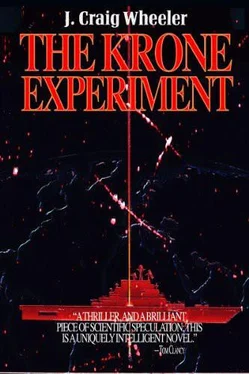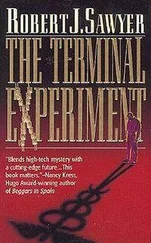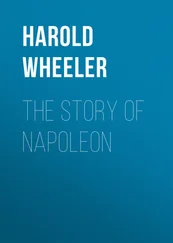Isaacs downplayed such doubts in working over the final draft. He wanted to make as much impact as possible to forestall a decision to go after Cosmos 2112 with the shuttle. He relied on the state of emergency to go out of channels and took the report directly to Drefke. The Director was clearly impressed with the idea. Isaacs knew he would then show it to McMasters, but by then the original impact would have had its maximum effect. He would get the most positive response possible when Drefke in turn reported to the National Security Council and the President.
Korolev stirred at his desk, reached up and punched off the button on the neck of the gooseneck lamp, leaving the room to share the deepening light of dusk. He rose and moved to the window. From this upper floor of the Academy of Sciences building he could see a stretch of lights now winking on over Moscow. For years, no, decades now, he had stood at this window watching those lights at odd hours of the night as he contemplated some problem. How many there had been. Practical Earth-shattering problems imposed by the voracious military: explosions, implosions, shock waves, the bomb. Later, intense radiation, hyper velocities, directed energy weapons. What did the Americans call them? Buck Rogers stuff. Lovely, basic problems. Microscopic, the innards of particles, and the innards of those in turn, and then of those. Cosmological problems, the wondrous workings of Einstein’s mind on vast scales.
Tonight, a small but troubling problem. Some American was quick and thoughtful. He could see the mental play behind the words. Yes, the suggestion of a meteorite was bold, for all its obviousness. It was one of the first that had occurred to him as well. The author of this report had pushed it for all its worth, but he also knew the limitations. Korolev could read between the lines and see where the American had suppressed his reservations. What the American did not know were the results of the follow-up report that had come directly to him. The punctures were all wrong for a meteorite with enough impact to penetrate the carrier decks. There was no downward flaring, the holes looked drilled, not punched. They had done a metallurgical test: there was no meteorite material. The Americans had not yet stolen that report. It was no meteorite.
Although there were features that did not fit, a lack of heat searing, for instance, Korolev had been compelled to state that a beam weapon seemed the most plausible explanation. His superiors had demanded some hypothesis and he could think of no other. He had not anticipated that they would mistrust their intelligence so badly as to suspect that the Americans had leap-frogged them and orbited such a weapon.
What troubled him, beyond the still unexplained nature of the Novorossiisk event, was the sincerity in this report. He was convinced that the author would eventually come to the conclusion that a meteorite could not be involved, but this report was not a sham. The author pushed the meteor idea too strongly because he wanted it to be true. The whole tone told Korolev that the report was based on the secure knowledge of the author that the Americans were not involved with the Novorossiisk. That was the trouble. His government knew he had already considered and rejected the meteor hypothesis. They would reject the suggestion by the Americans. Could he convince them of the Americans’ uninvolvement with the Novorossiisk based not on the contents, but on his sense of the motivation of the report on his desk? There would be much resistance. They were convinced the Americans were involved, somehow, and now there was the irrevocable act of the destruction of the American spy satellite. Korolev continued to stare out over the streets until the dusk faded to deepest black.
The first half of April slipped away as Isaacs spent two hard weeks probing the meteor theory. He called in projectile experts from around the country, and his top people visited various test sites. The harder they worked, the less likely the idea seemed. Boswank had traced the Novorossiisk report to one of the most respected members of the Soviet Academy of Sciences, Academician Viktor Korolev. That seemed a positive note: his reputation as a profound and unprejudiced thinker was well-established. Then at the end of the first week came the curt Soviet reply to Isaacs’s report. A meteor had been previously considered and rejected. With Korolev”s reputation behind that statement, and the increasingly negative results of his own team’s study, Isaacs knew he was losing any power to influence events. To make matters worse, the Soviet reply was defensive and belligerent. It yielded no hint that they conceded the innocence of the Americans in the Novorossiisk affair, certainly no confession that they might have mistakenly overreacted in the destruction of the FireEye. The only good news was that with the act of retribution the Yellow Alert had been cancelled. The Backfire aircraft were returned to normal routine; the missiles recapped snugly; the troops redeployed.
Isaacs walked slowly down the hall from Drefke’s office and punched the elevator button. The Director had just returned from the meeting of the National Security Council. Isaacs had read the result on his face. The shuttle was going up tomorrow. The crew was to disable the Cosmos 2112 and bring it back in the cargo bay. Or fry trying.
He got off at his floor and continued his thoughtful pace. He opened the outer door to Kathleen’s office and was surprised to see Pat Danielson sitting there with an expectant smile and a pile of computer output and charts on her lap. The smile faded when she saw the-heavy cloud on Isaacs’s face.
“Is this a bad time?”
She detected Isaacs’s quick visible effort to compose himself. His voice had a forced heartiness.
“Not at all.” He smiled ruefully. “No worse than any other time. You have something important?”
She glanced down at the bundle of paper clutched possessively on her lap, and her voice carried an overtone of excitement.
“I think you’re going to find your curiosity about this seismic signal justified.”
Isaacs had to think for a second to recall what she was talking about. He was too preoccupied with the historical clash scheduled to take place over their heads tomorrow to give much attention to the task he had assigned her, but the little wheels had to be greased, just like the big ones. A little investment of his time would keep Danielson performing efficiently.
He crossed to the door to his office and held it open in welcome as she rose and hustled through. She deposited the material on his desk and took the chair across from him.
“It wasn’t just a transient then?” he asked.
“On the contrary, the more we learn about it, the longer we can trace it back through the earlier data — several months’ worth now.” She pointed to the stack of paper. “Here’s the latest output, hot off the printer.”
He gestured outward with both hands, palms up, encompassing the output and the young woman.
“Shoot,” he said, striving to concentrate on what she had to say.
“With a longer time base, more information becomes available. At first all one could tell was that the signal repeated itself. We had only a crude idea of the period and no notion of the location. We’ve worked very hard to obtain a better estimate of the period. The figure of an hour was an alias. The true period is somewhat less than ninety minutes. This update shows that we’re beginning to get a handle on the location. Would you care to guess?”
Danielson did not usually play such little games, but came straight out with the facts. She thinks there’s something special here, thought Isaacs. Aloud he said, “Undoubtedly, it’s coming directly from the situation room in the Kremlin.”
Читать дальше











